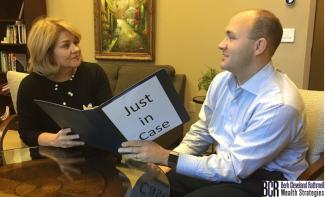
How to Prepare in Advance for the Death of a Spouse
All marriages end at some point, but the most blessed ones end with the death of a spouse. If you ask any widow or widower, most will tell you they knew it would happen someday, but they never planned for it to happen when it did. When the time comes, it can be very difficult, in that moment, to think of all you need to do if you don’t already have a plan in place. Being prepared for the “business” part of losing a spouse makes the personal aspect of grieving much easier to bear, so it’s good to know how to be prepared for the death of a spouse, and to do it in advance.
How to be prepared for the death of your spouse
1. Make sure you are knowledgeable about your financial affairs. A widow or widower who has no knowledge about their finances is in a dangerous situation; things can be overlooked and predators can take advantage. If your spouse is in charge of paying the bills and handling the bank account, that’s fine – just make sure you know about everything involved. Taking care of item #3 will do the job.
2. Get your legal documents in order. Make sure you have a will and that you always have a current copy of it, as well as copies of any trust documents you may need.
3. Create a file of “just in case" information. This should be in a file, portfolio, or binder, and someone other than you and your spouse should know where it’s located. The file should include:
- Identification – birth certificate, marriage license, social security cards
- Estate Documents – wills and trusts
- Insurance – copies of policies and policy numbers for life, health, disability, long-term care, etc. Include premium payments, how received, website URL with user ID and password
- Residence – Deed, mortgage information, and homeowners insurance
- Autos – car titles, car insurance, and loan information
- Other Property – such as jewelry, boats, and anything with a title document
- Credit Cards – list of cards, card number, website, user ID and password, and how payment is made
- Finance – list of bank and investment accounts, account numbers, website, user id and password, and contact name
- Tax Returns – Copy of last tax return, info on quarterly payments, status of last filing, and accountant’s contact information
- List of Monthly Bills – name on the account, name of vendor, how bill is received (snail mail or email), how bill is paid, website URL, user ID and password
- Online Accounts – list of all passwords not listed in other sections for accounts, including user ID and passwords for email accounts, social media, business websites, etc.
- Safety Deposit Box - Location of safety deposit box, location of keys, copy of authorization for access
- Business Agreements – Leases, partnership agreements, obligations, and a list of employee benefits, including pension payments
- Contact List – Name and contact information for wealth manager or financial advisor, accountant, lawyer, executor, priest/minister/rabbi, friends and business associates to notify
- To-Do List – Things that need to be accomplished and when (First Acitons, Soon after Funeral/Memorial Service, As Soon as Possible, and As Needed)
- Funeral Plans – Documents for pre-arranged items, wishes regarding burial or cremation, burial policies, who is to write the obituary, music selections, etc.
4. Make sure someone other than you and your spouse knows where your “just in case” file is. If you and your spouse should die together in an accident, someone will need to be able to locate this information.
5. Don't wait until you're “old” to do this. Just like you shouldn’t wait until you have a child to buy life insurance, you shouldn’t wait until someone is near death to prepare for it. Everyone knows death is inevitable, but no one can predict when it will happen. People die unexpectedly all the time. Being prepared in advance will greatly ease the burden of those who are left behind.

